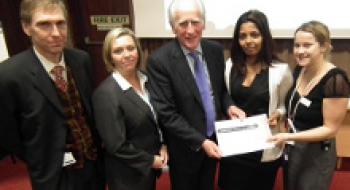Programme to improve the audits of junior doctors

Best practice: Improving the quality of junior doctors' audits by focussing on the difference this could made to patient care across the trust and creating a showcase event in which the findings could be presented
Who did it: Gaynor Smith, Clinical Audit/Research Development Training Co-ordinator, and Dr A Choules, Consultant Paediatrician /Postgraduate Clinical Tutor/Foundation School Director (Keele) from Burton Hospitals NHS Foundation Trust
Background
It is recognised that there is often a poor standard of junior doctor audits, including a failure to undertake re-audit. In response, we decided to adopt a training programme that made the connections between clinical audits and patient care. Our aim was to enhance junior doctors' experiences of conducting clinical audits and improve patient safety through the same process. This has been a very successful project, the trust have received very positive feedback from the trainees. We are currently rolling out the programme to the current intake of junior doctors for 2013-14
Method
We appointed a dedicated trainer in clinical audit and set up a collaborative group comprising a clinical tutor, patient safety lead and clinical audit trainer.
This group agreed and allocated nine audits to groups of foundation year 1 doctors.
Topics were chosen because of their importance to patient safety across the trust. Formal training was given and supported by workbooks and teaching sessions. Criteria for quality assessment of final projects were agreed and shared with learners.
We allocated the groups so that at any one time one of the members would be working in the relevant speciality area. Consultants were recruited to supervise each group and give clinical support. We organised a showcase event for presentation of projects, attended by the trust chief executive and chairman. A prize was awarded to the group scoring highest by a panel of assessors.
Results
- The high standard of the presentations demonstrated the effectiveness of the training and good understanding of both the process of audit and the subjects audited.
- Learners’ feedback testified to the value of the training programme, support given and consequent understanding of the clinical audit process.
- Completed workbooks provided evidence of learning activities for assessment and e-portfolios.
The next step
We reflect on areas that can be improved in the programme, gain further learner feedback and continually evaluate the programme.
Key Messages
- Emphasising the importance of audit and patient safety to junior doctors provides them with confidence to tackle patient safety issues.
- The team worked together to ensure clinical audit workshops did not coincide with other teaching sessions the junior doctors had to attend.
- Very early engagement with the trainees (September) had a positive and practical effect on their attitudes to clinical audit.
- Presenting the first cycle of the audit findings in December provided a solid basis for future recommendations and allowed time to enact them.
- Aiming to present re-audit findings in May will allow completion of a full audit cycle.
For further information contact Gaynor Smith, Clinical Audit/Research Development Training Co-ordinator, Burton Hospitals NHS Foundation Trust - Gaynor.smith@burtonft.nhs.uk